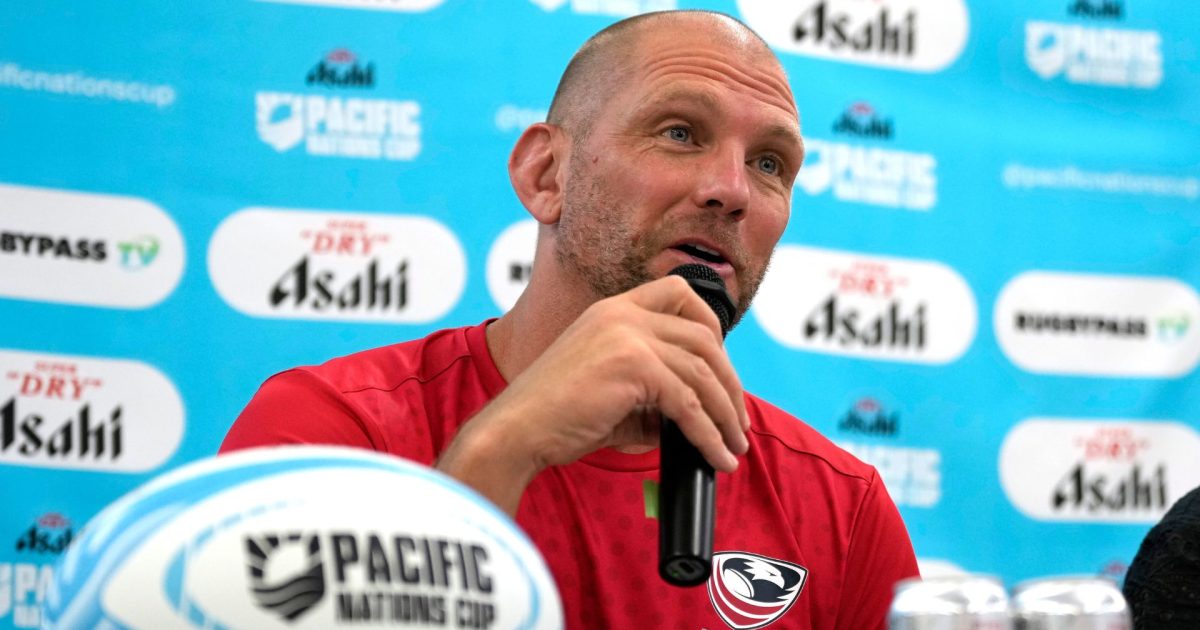Scott Lawrence: 'I think the forward pass for the Fiji try was a pivotal moment in the game'

USA head coach Scott Lawrence is never one to mince his words when breaking down his team’s performance.
Speaking today ahead of his team’s final Asahi Super Dry Pacific Nations Cup clash with Samoa in the third-place play-off match, Lawrence reflected on his team’s performance against Fiji.
“I think it was a pretty solid performance from our men,” Lawrence summarised before delving into the details, “We were able to execute the game plan that we wanted to, and we had a couple of opportunities to score in the game.”
Highlighting where he felt the match got away from his team, Lawrence did not mince his words when referencing Fiji’s second try scored by backrow Elia Canakaivata. This score took Fiji two converted tries clear at 17 – 3, bringing the Eagles’ momentum to a shuddering halt.
“I think the forward pass for the Fiji try was a pivotal moment in the game, and I think, nonetheless, we should have taken advantage of our opportunities there. So we’ll look to just be better inside the twenty-two this week in terms of converting.”
Struggling mightily at scrum time during the opening thirty-five minutes, Lawrence discussed the issue and spoke about his thought process for naming a new front row.
“I think once we were able to reset and get our scrum height right, we would be solid in the game against Fiji.
“It wasn’t as much down to personnel as it was around our own process, which I think we were able to fix at halftime. This week, Jack Escarro is out with an injury, so we’ll change that with Jake Turnbull coming in.
“Peyton (Telea) is another of the younger players we invited to see what we were working with and to start his journey to becoming a future Eagle.
“He’s come along really well; he’s done a lot of work with the team. He’s four weeks more conditioned than he was when he came in, and that’s a huge part of it.
“He’s hung right in there at set piece, so I think when you look at Peyton, I get excited by the potential of what he can offer. You have a ball-carrying ball-playing front row, and when you can add that into the mix next to a hooker, it opens up your attack and gives you options to do more things.
“So that part about Peyton is exciting, and I think he’ll go well tomorrow, and we’ll be able to use that in the future.”
Despite having 70% of their possession inside the Fijian half, the Eagles could not find a way through the relentless Fijian defence. Referencing the need to remain patient when presented with opportunities, Lawrence was frank in his assessment of his team attack.
“It probably just comes down to decision-making at times.
“Sometimes we probably get stuck thinking about it too much, and then overthinking stops us from just playing naturally and playing the way we want to play.
“Then other times it’s just down to execution; at this test level, it comes down to the one, two percenters. If one person happens to miss their clean, then they’re over the ball just like that.
“It just probably comes down to those two points, and we worked really hard this week on those points specifically, and I think we’ll make some big shifts this weekend around it.”
On the flip side of proceedings, Lawrence’s side ended their clash with Fiji sitting on an 80% tackle success rate as they, at times, struggled to contain the explosive Fijian attack. Probing this point, Lawrence was asked if the defensive issues were down to the system or simply lapses in concentration.
“If you look at the source of the three tries, one of them was a defensive try from Fiji where they turned us over on the try line, so we kind of look at that and go that’s down to us just being more clinical in how we exited.
“Again, the second one was a very good defensive play; it was a forward pass. So I wiped that one off the board, to be honest.
“I think the defence did their job, and then Fiji will always find one-on-ones.
“Most test teams have one or two explosive plays where they’ll have a special play they may even score off of when they get it right.
“We thought they would always have the opportunity. But if you look back at the games Fiji played before, they had six to seven explosive plays with tries in their previous games. So I was happy with our consistency in defence last week.”
Delving into his team’s approach to the contest, the coach was asked if his team had discussed a more pragmatic approach to keeping the scoreboard ticking over. Asserting that his team took the points when they were available, Lawrence stressed that his team does not dwell on missed opportunities but instead focuses on how to better capitalise on them going forward.
“When you look at where the penalties occurred, there were two within kick distance. In our opinion, we took both of those opportunities to kick for points.
“The ones that were not, we went for the corner where it wasn’t within our range. So I think just for us, in terms of the opportunities, one was just a lost ball in the lights at the line-out, and that happens; it’s part of the game.
“Another opportunity was when we had someone right in front of the ruck we could have run at, and they saw something else. So we don’t dwell on it too much, we just kind of look at it and say we’ll keep the ball next time and work our way in.”































🥱 if it was a forward try then they would have checked it with tv match official. It's ok, you guys lost.